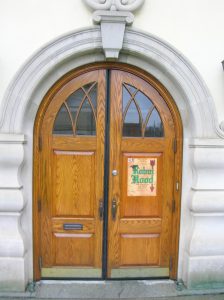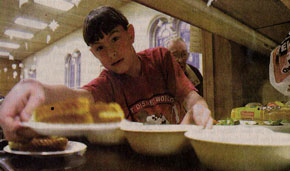 In the past two decades, our firm has prepared almost seventy Master Plans for churches throughout the country. Although a good number of these churches have been suburban churches, many of our clients, such as Emmanuel Baptist Church in Albany, NY and Trinity Lutheran Church in Worcester, MA, are urban churches. As part of the Master Plan process, we analyze the space utilization of the church’s existing facilities, including use by outside groups. Not surprisingly, while the suburban churches often have more program needs than space, the opposite is typically true of the urban churches, who often have a huge surplus of space leftover from earlier expansion projects. One of the most striking examples of this with whom we have worked was Christ Church United Methodist in Glens Falls, NY. A 1972 census of Christ Church lists a 1,500 seating capacity and a total of 46 rooms available for use of church school on Sunday. Today, only a few rooms are needed for Christian Education. Some of that excess space has been rented for years to a private, not-for profit psychiatric and vocational rehabilitation program but space is still available for other uses,
In the past two decades, our firm has prepared almost seventy Master Plans for churches throughout the country. Although a good number of these churches have been suburban churches, many of our clients, such as Emmanuel Baptist Church in Albany, NY and Trinity Lutheran Church in Worcester, MA, are urban churches. As part of the Master Plan process, we analyze the space utilization of the church’s existing facilities, including use by outside groups. Not surprisingly, while the suburban churches often have more program needs than space, the opposite is typically true of the urban churches, who often have a huge surplus of space leftover from earlier expansion projects. One of the most striking examples of this with whom we have worked was Christ Church United Methodist in Glens Falls, NY. A 1972 census of Christ Church lists a 1,500 seating capacity and a total of 46 rooms available for use of church school on Sunday. Today, only a few rooms are needed for Christian Education. Some of that excess space has been rented for years to a private, not-for profit psychiatric and vocational rehabilitation program but space is still available for other uses,
For the past twenty-five years, Partners for Sacred Places has been helping churches like  Christ Church find ways to make their facilities more of a community asset. This often involves sharing space with outside groups whose mission and vision is consistent with the church’s. This might include childcare, food pantries, scouting and a variety of other groups. More and more often, these are expanding to arts groups as well. The problem has always been identifying which churches have space available and which groups are looking for space and bringing the groups together. Not surprisingly, the Chicago office of Partners for Sacred Places has taken the lead on this.
Christ Church find ways to make their facilities more of a community asset. This often involves sharing space with outside groups whose mission and vision is consistent with the church’s. This might include childcare, food pantries, scouting and a variety of other groups. More and more often, these are expanding to arts groups as well. The problem has always been identifying which churches have space available and which groups are looking for space and bringing the groups together. Not surprisingly, the Chicago office of Partners for Sacred Places has taken the lead on this.
On Wednesday, November 12, Partners launched iSPi (“isp-ee”), the nation’s first online hub for creative sacred placemaking. Reverend Erik Christensen, senior pastor of St. Luke’s Lutheran Church of Logan Square in Chicago, explained that St. Luke’s used to rent out its spaces to whomever it could, simply to bring in extra revenue. With Partners’ support and guidance, St. Luke’s is now home to Theatre Y, whose mission is to “create poetic and visceral theater, mine the contradictions of the human experience, and challenge audiences to find universally shared meaning.” According to Rev. Christensen, “Mission-based space sharing has a really positive impact on the congregation because it helps them see the activity that takes places in the building throughout the week, and not just when we gather for worship, as connected to their own identity.” Theatre Y’s mission is compatible with St. Luke’s values, resulting in a stronger and more sustainable partnership.
Although it is currently operating only in Chicago, iSPi has potential for replication across the country – in cities, towns, and rural areas. For more information about this exciting new database, visit Partners’ webpage about iSPi. And if you are not in Chicago but need help with filling unused space, please contact our office for information on how we can help you find the right match for your church.
